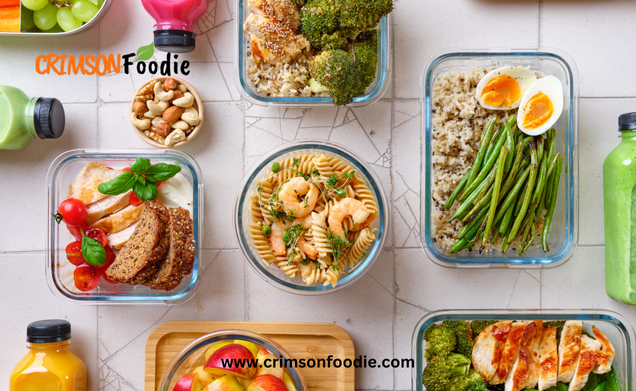1. The Importance of a Healthy Meal Plan
Sticking to a healthy meal plan plays a vital role in achieving and maintaining overall well-being. It goes beyond temporary dieting trends, offering a structured way to manage your food intake and promote good health. Planning meals in advance ensures that you have nutritious options available, helping you avoid impulse decisions that could lead to unhealthy eating habits. A well-organized meal plan not only helps with weight management but also ensures that your body receives all the essential nutrients it needs to function optimally.

2. Benefits of Sticking to a Healthy Meal Plan
2.1. Improved Physical Health
A consistent meal plan ensures balanced nutrition, which reduces the risk of chronic diseases like diabetes, high blood pressure, and heart disease. It also helps regulate blood sugar levels and boosts the immune system, contributing to better energy levels throughout the day.
2.2. Enhanced Mental Well-Being
Good nutrition positively impacts mental health by improving focus, mood, and cognitive function. When meals are well-planned, you are less likely to experience mood swings caused by fluctuations in blood sugar.
2.3. Long-Term Lifestyle Improvements
Meal planning fosters healthy habits that become second nature over time. A sustainable routine of eating healthy foods creates a lifestyle shift, making it easier to maintain good health for years to come.
3. Common Barriers to Following a Meal Plan
3.1. Lack of Time and Busy Schedules
In today’s fast-paced world, finding time to cook can be challenging. Many people rely on convenience foods because of their hectic schedules.
3.2. Food Cravings and Emotional Eating
Stress and emotions can trigger cravings, leading to binge-eating and deviations from a meal plan.
3.3. Social Situations and Eating Out
Social gatherings and dining out can present temptations that make it hard to stick to planned meals.
4. Strategies for Meal Plan Success
4.1. Setting Realistic Goals
Instead of making drastic changes, aim for small, achievable goals. This prevents overwhelm and builds confidence over time.
4.2. Planning and Prepping Meals in Advance
Allocate time to prepare meals or ingredients for the week. Batch-cooking and freezing meals can save time and ensure you have healthy options ready.
4.3. Incorporating Variety and Flexibility
Eating the same meals every day can become monotonous. Switch up your recipes and allow for flexibility to make your plan enjoyable.
5. Building Healthy Eating Habits Gradually
5.1. Start with Small Changes
Focus on one meal or snack at a time. For example, switch from sugary breakfast cereals to oatmeal or eggs.
5.2. Use a Habit Tracker
Tracking progress keeps you motivated. Apps or simple journals can help you see patterns and improvements over time.
5.3. Celebrate Milestones
Reward yourself when you hit key goals, such as sticking to your plan for a month. Positive reinforcement builds momentum.
6. Creating a Personalized Meal Plan
6.1. Understanding Your Dietary Needs
Consider personal goals such as weight loss, muscle gain, or improving energy. Dietary restrictions, like food allergies, should also shape your plan.
6.2. Balancing Macronutrients and Micronutrients
Ensure that your meals include a proper balance of carbohydrates, proteins, and healthy fats, along with vitamins and minerals.
6.3. Incorporating Favorite Foods in Moderation
A good plan doesn’t have to exclude indulgences. Enjoy treats in moderation to stay on track without feeling deprived.
7. How to Stay Motivated Over Time
7.1. Join Support Groups or Communities
Being part of a group can provide encouragement and new meal ideas. Support from others makes it easier to stay consistent.
7.2. Track Progress with Journals or Apps
Recording your meals and how you feel after eating can highlight positive changes and areas for improvement.
7.3. Avoid All-or-Nothing Thinking
It’s okay to have slip-ups. Focus on consistency rather than perfection to avoid burnout.
8. Overcoming Setbacks and Staying on Track
8.1. Learn from Mistakes Rather Than Giving Up
A setback is an opportunity to learn. Reflect on what triggered the deviation and how to avoid it next time.
8.2. Identify Triggers and Plan Ahead
If you know certain situations trigger unhealthy eating, prepare alternatives in advance.
8.3. Develop a Growth Mindset
Focus on progress, not perfection. Each step toward healthier eating is a win.
9. Practical Meal Planning Tools and Apps
9.1. Recipe Websites and Meal Planning Templates
Websites like AllRecipes and MyFitnessPal offer great ideas for meal plans.
9.2. Grocery List Organizers
Apps such as AnyList can streamline your shopping experience, ensuring you get everything needed for your meals.
9.3. Food Journaling Apps
Apps like Yazio or LoseIt! allow you to log meals and track your nutritional intake easily.
10. Budget-Friendly Meal Planning Tips
10.1. Plan Meals Around Seasonal Ingredients
Seasonal fruits and vegetables are often cheaper and fresher.
10.2. Cook in Bulk and Freeze Meals
Batch-cooking reduces waste and saves both time and money.
10.3. Use Affordable Protein Sources
Incorporate lentils, beans, and eggs as cost-effective alternatives to expensive cuts of meat.
11. Healthy Meal Ideas for Beginners
11.1. Quick Breakfast Options
Oatmeal with fruit, Greek yogurt, or smoothies make nutritious and easy breakfasts.
11.2. Simple Lunches to Take to Work
Salads with lean protein, wraps, or grain bowls are quick and portable.
11.3. Easy Dinners with Minimal Cooking Time
Stir-fries, sheet pan meals, or one-pot pasta dishes are simple to prepare after a long day.
12. Handling Social Events and Dining Out
12.1. Check Menus in Advance
Look for healthy options on the menu before going out to stay prepared.
12.2. Practice Mindful Eating During Events
Focus on enjoying your food and stop eating when you feel full.
12.3. Choose Healthy Alternatives When Possible
Opt for grilled instead of fried items, and substitute fries with a side salad.
13. The Role of Accountability Partners or Coaches
13.1. Benefits of Having Accountability Buddies
Having someone to share your journey with increases motivation and adherence to the plan.
13.2. Working with a Nutritionist or Dietitian
Professional guidance can help tailor your plan to fit your goals and nutritional needs.
13.3. Leveraging Online Communities for Support
Joining communities on platforms like Reddit or Facebook can offer support and inspiration.
14. FAQs: Common Questions About Sticking to a Meal Plan
1. Can I still indulge occasionally?
Yes, occasional indulgences help prevent feelings of deprivation.
2. What should I do if I miss a meal?
Don’t stress. Adjust your next meal to balance your intake.
3. How do I handle cravings?
Drink water or have a healthy snack like nuts or fruit.
4. Is meal planning expensive?
Not necessarily. You can save money by planning around seasonal produce.
5. What if my family has different food preferences?
Create meals that can be easily customized to suit everyone.
6. How often should I update my meal plan?
Review your plan every few weeks to adjust for changing needs.
15. Conclusion: Make Healthy Eating a Sustainable Habit
A healthy meal plan is more than just a diet – it’s a lifestyle choice that promotes long-term well-being. By taking small, consistent steps and staying flexible, you can make healthy eating an enjoyable and sustainable part of your life.




